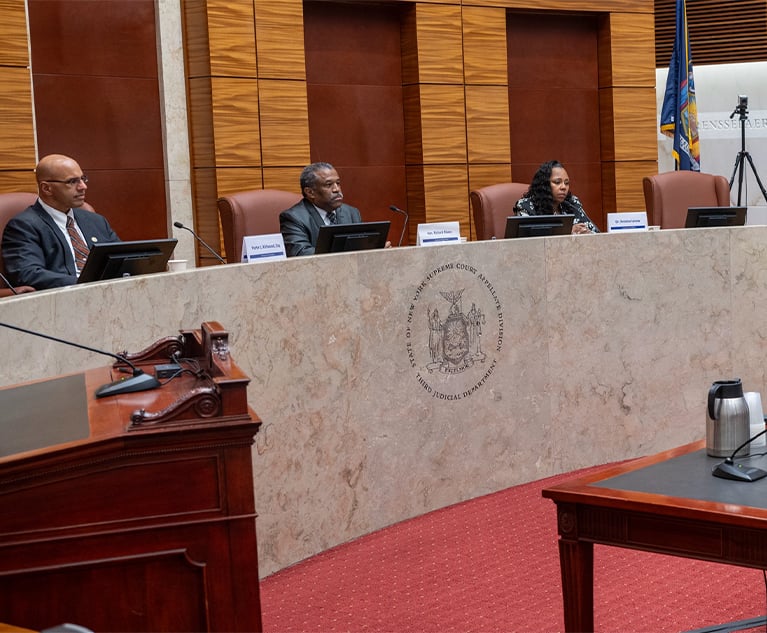SCOTUS Halts Commerce Secretary's Deposition in Census Suit
That doesn't mean the plaintiffs in the lawsuit will definitely not be allowed to depose Ross. His deposition was stayed by the Supreme Court, pending further review of the district court's decision.
October 22, 2018 at 10:18 PM
6 minute read
 Wilbur Louis Ross Jr., U.S. secretary of commerce. (Courtesy photo)
Wilbur Louis Ross Jr., U.S. secretary of commerce. (Courtesy photo)The U.S. Supreme Court has blocked the New York attorney general from taking the deposition of U.S. Commerce Secretary Wilbur Ross in a lawsuit over his department's plan to ask about citizenship on the 2020 U.S. census scheduled to go to trial in less than two weeks.
His testimony was delayed indefinitely while the Trump administration formally asks the Supreme Court to review a decision by Judge Jesse Furman of the U.S. District Court for the Southern District of New York that allowed the deposition in the first place.
That doesn't mean the plaintiffs in the lawsuit will definitely not be allowed to depose Ross. His deposition was stayed by the Supreme Court, pending further review of Furman's decision. The court could ultimately end up siding with Furman and allow the deposition to go forward.
Supreme Court Justice Neil Gorsuch suggested that would be unlikely in an opinion that accompanied the order Monday evening.
“Today, the Court signals that it is likely to grant the government's petition,” Gorsuch wrote. “It stays Secretary Ross's deposition after weighing, among other things, the likelihood of review and the injury that could occur without a stay.”
Gorsuch also questioned a decision from the district court in July, in which Furman said there was “strong” evidence the Trump administration acted in bad faith when deciding to ask about citizenship on the next census.
Part of Furman's decision cited how Ross had already started thinking about adding the question shortly after he was confirmed last February—months before the DOJ requested it. Ross confirmed as much in a memo in June. That shouldn't have been enough to show bad faith, Gorsuch wrote.
“As evidence of bad faith here, the district court cited evidence that Secretary Ross was predisposed to reinstate the citizenship question when he took office,” Gorsuch wrote. “But there's nothing unusual about a new cabinet secretary coming to office inclined to favor a different policy direction, soliciting support from other agencies to bolster his views, disagreeing with staff, or cutting through red tape.”
A spokeswoman for the DOJ called the Supreme Court's decision “a win” in a statement.
“The Supreme Court's decision is a win for protecting the rights of the Executive Branch,” said DOJ Spokeswoman Kelly Laco. “The intrusive and improper discovery in this case disrupts the orderly functioning of our government and is, as Justices Gorsuch and Thomas noted, 'highly unusual.' The Department of Justice is committed to protecting the rule of law and looks forward to further proceedings before the Supreme Court.”
The deposition of former Assistant Attorney General for Civil Rights John Gore, however, will be allowed to take place, according to the order. He allegedly 'ghostwrote' the letter from the DOJ requesting that the question be added to the census to better help enforce the Voting Rights Act.
The Trump administration had asked the Supreme Court to stay extra-record discovery and the depositions of both Ross and Gore. The deposition of Ross will have to wait, but the plaintiffs in the case will be allowed to depose Gore in the coming days and obtain any discovery that was withheld, pending the Supreme Court's decision.
A spokeswoman for New York Attorney General Barbara Underwood, who is leading a coalition of 18 state attorneys general in the case, said Monday evening that they welcomed the court's decision outside of its decision to keep her from taking Ross' deposition.
“We welcome the Court's decision to allow us to complete discovery in the case, with the exception only of Secretary Ross' deposition, which remains on hold pending further briefing,” said Amy Spitalnick, spokeswoman for Underwood. “We'll get to the bottom of how the decision to demand citizenship status was made, as we continue our case to ensure a full and fair Census.”
Underwood's office has argued that asking about immigration status on the next census could lower turnout in states with a large immigrant population, like New York. That could lead to fewer representatives in Congress and the Electoral College for those states. It could also mean less federal funding in areas like education and health care.
A lawsuit from the New York Immigration Coalition has been consolidated with Underwood's lawsuit for trial. The organization is represented by the New York Civil Liberties Union, the American Civil Liberties Union and Arnold & Porter.
Perry Grossman, senior staff attorney at NYCLU, reacted to the decision in a statement Monday evening.
“The more we uncover in this case, the clearer it is that the Trump administration contrived the citizenship question in order to undercount and underserve communities of color, immigrants, and the poor,” Grossman said. “They shouldn't get a pass on telling the American people the truth.”
The clock is ticking for the plaintiffs to depose Ross before the suit is scheduled to go to trial. Furman has set a firm trial date for Nov. 5, which is less than two weeks from now.
The Supreme Court blocked Ross' deposition until next Monday evening while the Trump administration prepares its petition for a review of Furman's decisions allowing extra-record discovery and the depositions of Gore and Ross. The hold will then remain in effect for as long as the court takes to decide on the petition.
Gorsuch said in his opinion Monday evening that Furman should consider moving the trial date, considering the Supreme Court's review of his decisions. The parties had agreed in a status conference with last Wednesday to keep the date, at least for now.
“One would expect that the Court's order today would prompt the district court to postpone the scheduled trial and await further guidance,” Gorsuch wrote. “After all, that is what normally happens when we grant certiorari or indicate that we are likely to do so in a case where trial is imminent.”
Senior Trial Counsel Elena Goldstein and Executive Deputy Attorney General Matthew Colangelo are leading the case for New York. Kate Bailey is the lead attorney for the Trump administration.
READ MORE:
Will Stephen Bannon's Involvement Impact NY AG's Challenge to Census Citizenship Query?
Commerce Secretary's Deposition Pushed Back in Census Suit as SCOTUS Reviews
Steve Bannon Helped Formulate Citizenship Question for Census, DOJ Filing Says
This content has been archived. It is available through our partners, LexisNexis® and Bloomberg Law.
To view this content, please continue to their sites.
Not a Lexis Subscriber?
Subscribe Now
Not a Bloomberg Law Subscriber?
Subscribe Now
NOT FOR REPRINT
© 2025 ALM Global, LLC, All Rights Reserved. Request academic re-use from www.copyright.com. All other uses, submit a request to [email protected]. For more information visit Asset & Logo Licensing.
You Might Like
View All

Law Firms Expand Scope of Immigration Expertise Amid Blitz of Trump Orders
6 minute read
'Reluctant to Trust'?: NY Courts Continue to Grapple With Complexities of Jury Diversity
Trending Stories
- 1Uber Files RICO Suit Against Plaintiff-Side Firms Alleging Fraudulent Injury Claims
- 2The Law Firm Disrupted: Scrutinizing the Elephant More Than the Mouse
- 3Inherent Diminished Value Damages Unavailable to 3rd-Party Claimants, Court Says
- 4Pa. Defense Firm Sued by Client Over Ex-Eagles Player's $43.5M Med Mal Win
- 5Losses Mount at Morris Manning, but Departing Ex-Chair Stays Bullish About His Old Firm's Future
Who Got The Work
J. Brugh Lower of Gibbons has entered an appearance for industrial equipment supplier Devco Corporation in a pending trademark infringement lawsuit. The suit, accusing the defendant of selling knock-off Graco products, was filed Dec. 18 in New Jersey District Court by Rivkin Radler on behalf of Graco Inc. and Graco Minnesota. The case, assigned to U.S. District Judge Zahid N. Quraishi, is 3:24-cv-11294, Graco Inc. et al v. Devco Corporation.
Who Got The Work
Rebecca Maller-Stein and Kent A. Yalowitz of Arnold & Porter Kaye Scholer have entered their appearances for Hanaco Venture Capital and its executives, Lior Prosor and David Frankel, in a pending securities lawsuit. The action, filed on Dec. 24 in New York Southern District Court by Zell, Aron & Co. on behalf of Goldeneye Advisors, accuses the defendants of negligently and fraudulently managing the plaintiff's $1 million investment. The case, assigned to U.S. District Judge Vernon S. Broderick, is 1:24-cv-09918, Goldeneye Advisors, LLC v. Hanaco Venture Capital, Ltd. et al.
Who Got The Work
Attorneys from A&O Shearman has stepped in as defense counsel for Toronto-Dominion Bank and other defendants in a pending securities class action. The suit, filed Dec. 11 in New York Southern District Court by Bleichmar Fonti & Auld, accuses the defendants of concealing the bank's 'pervasive' deficiencies in regards to its compliance with the Bank Secrecy Act and the quality of its anti-money laundering controls. The case, assigned to U.S. District Judge Arun Subramanian, is 1:24-cv-09445, Gonzalez v. The Toronto-Dominion Bank et al.
Who Got The Work
Crown Castle International, a Pennsylvania company providing shared communications infrastructure, has turned to Luke D. Wolf of Gordon Rees Scully Mansukhani to fend off a pending breach-of-contract lawsuit. The court action, filed Nov. 25 in Michigan Eastern District Court by Hooper Hathaway PC on behalf of The Town Residences LLC, accuses Crown Castle of failing to transfer approximately $30,000 in utility payments from T-Mobile in breach of a roof-top lease and assignment agreement. The case, assigned to U.S. District Judge Susan K. Declercq, is 2:24-cv-13131, The Town Residences LLC v. T-Mobile US, Inc. et al.
Who Got The Work
Wilfred P. Coronato and Daniel M. Schwartz of McCarter & English have stepped in as defense counsel to Electrolux Home Products Inc. in a pending product liability lawsuit. The court action, filed Nov. 26 in New York Eastern District Court by Poulos Lopiccolo PC and Nagel Rice LLP on behalf of David Stern, alleges that the defendant's refrigerators’ drawers and shelving repeatedly break and fall apart within months after purchase. The case, assigned to U.S. District Judge Joan M. Azrack, is 2:24-cv-08204, Stern v. Electrolux Home Products, Inc.
Featured Firms
Law Offices of Gary Martin Hays & Associates, P.C.
(470) 294-1674
Law Offices of Mark E. Salomone
(857) 444-6468
Smith & Hassler
(713) 739-1250







